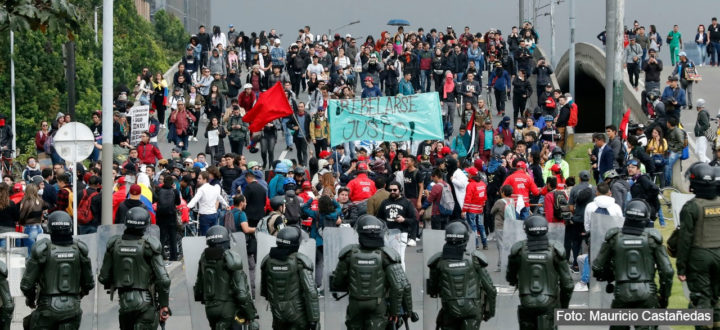Launched on Human Rights Day, December 10th, the document addresses the situation of students as protagonists in the defence of the right to education and other human rights and their increasing criminalisation in the region
With the support of the Norwegian Students’ and Academics’ International Assistance Fund (SAIH), the Latin American Campaign for the Right to Education (CLADE) launches today ( 12/10) the report “Criminalization and Violations of Students’ Human Rights in Latin America and the Caribbean. Reflections on the cases of secondary and university students in Chile, Colombia, Nicaragua and Honduras“.
Among the objectives of the document is the analysis and visibility of the situation of students in the region, as protagonists in the defence of the right to education and other human rights and their increasing criminalisation in contexts of social protest in Chile, Colombia, Nicaragua and Honduras.
“Raising information from the territories and the voices of social actors and their struggles is fundamental not only to make visible a trend that has gained ground in recent years in our continent, but also to address the proposals and the urgent need for States to fulfil their role as guarantors of all rights and, in this case, the right to participate, associate, express themselves freely and mobilize, peacefully, demanding the fulfillment of the Human Right to Education”, states Nelsy Lizarazo, CLADE’s General Coordinator.
For the preparation of the report, students from the aforementioned countries were interviewed. Their situation as protagonists in the defence of the right to education and other human rights and their increasing criminalisation in contexts of social protest in these four countries was analysed. In addition to the concrete cases presented, the research also analyses, in alliance with the Latin American Association of Education and Popular Communication (ALER), the role of the media in the process of criminalisation of students and student movements.
The document also considers the existence, extent and singularities of this phenomenon, as well as the profound effect it has not only on the right to education, but also on another set of fundamental human rights. In general terms, the following can be mentioned: impact on the rights of participation, freedom of expression, assembly and association; repression and excessive use of force; unfounded criminal proceedings aimed at paralysing or delegitimising their causes; arrests; imposition of criminal, civil and administrative sanctions; surveillance of student organisations; murder of students. In the field of education: expulsions, suspensions, cancellation of scholarships or other student benefits.
Findings and results
The findings and results of this process ratify some tendencies that had already been identified in other processes and actions that CLADE has been carrying out on this issue, as well as the serious impact they have on the right to education and on the whole set of human rights.
With regard to those responsible, the report identified a multiplicity of actors and factors that interact in the processes of criminalisation. With a relevant participation of the State, such as the increase of militarization (with the presence of the army above all) in schools and universities (violating university autonomy). The approval of laws that make it difficult to hold social demonstrations and protests or the criminalisation of conduct related to social protest. The opening of proceedings against students under different criminal figures without foundation and without the relevant evidence or on the basis of false evidence. The illegal detention, physical and psychological aggression of students and the school community. The murder during demonstrations or after having participated in protests by paramilitary groups and the emphasis on the inconveniences caused by the protests and not on the causes of the claims and/or the consequences of criminalisation by the media.
Among the impacts and consequences of the criminalisation process, the research identified serious restrictions to their right to education in secondary and higher education institutions, preventing or generating obstacles for the reincorporation of students, and in some cases even permanently; uses of physical violence including situations of torture, sexual abuse and even death.
Considerations and Recommendations
The report seeks to contribute to the regional panorama and reaffirms the need to urgently strengthen strategies that help reverse this phenomenon and guarantee the rights of all actors in the education community, in particular of students, offering a series of general recommendations and other specific ones addressed to different spheres (state government, human rights bodies, media, civil society, and the educational community).
Among the recommendations are the relevance of deepening the analysis of the context, the visibility, understanding, reporting and systematization of situations of criminalization, from a human rights and gender perspective. The articulation of efforts and measures from all spheres of society to advance in a greater recognition and consolidation of the right to social protest as a fundamental human right and as a mechanism for the defense and advocacy of the right to education, as well as the role of students as human rights defenders.






